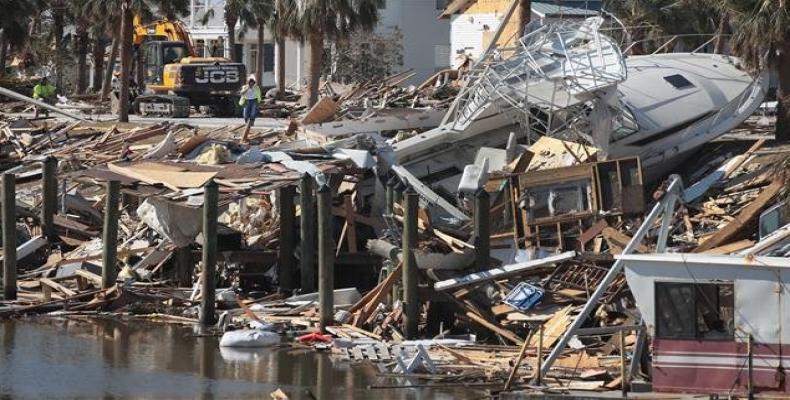Miami, October 24 (RHC)-- U.S. health workers say they are seeing increasing signs of mental problems in residents in the state of Florida more than a week after Hurricane Michael hit Southeastern United States, and the issue could turn a short-term disaster into a long-term recovery that will take years.
Tony Averbuch, who leads a disaster medical assistance team that is seeing 80 to 100 patients daily in tents set up in a parking lot of the badly damaged Bay Medical Sacred Heart hospital, said some people are showing signs of fraying.
“In any kind of disaster what we find is that people have been exposed to circumstances that are well beyond what they normally deal with day to day,” said Averbuch.
Just getting to the treatment site involves navigating streets with roadblocks and fallen utility lines, and the hospital building itself was ripped open by Michael’s powerful winds.
Signs of trauma aren’t a surprise for those who studied people after Hurricane Katrina in 2005.
Damage in several Florida cities was similar to that in the state of Mississippi, where entire communities were flattened by wind and storm surge.
Panama City and Mexico Beach could take years to rebuild, as did parts of New Orleans, Louisiana, after the region was flooded by Hurricane Katrina.
Dr. Irwin Redlener of the National Center for Disaster Preparedness at Columbia University observed widespread, long-lasting psychological effects after Katrina. One study found that, five years after the storm, parents reported more than 37 percent of children had been clinically diagnosed with depression, anxiety, or a behavior disorder.
Redlener says that’s in part because parents are overwhelmed and are less able to buffer their children from bad experiences. “They survived a major catastrophic event, which is good. But everything they knew is gone,” he said.
Research scientist David Murphey said children look to their parents for cues as how to respond to completely new and frightening situations. “If they see parents kind of falling apart at the seams, that’s going to create anxiety for the children as well,” said Murphey.
Dr. Emily Harville, an associate professor at Tulane University’s School of Public Health and Tropical Medicine in New Orleans, said most people will be back to where they were within a year or so, but others will have difficulty for a longer period. “There will be a small group that continues to have long-term mental health issues,” she said.
Michael struck Florida’s northwest coast near the small town of Mexico Beach on October 10th. The storm tore entire neighborhoods apart, reducing homes and businesses to piles of wood and siding, damaging roads and leaving scenes of devastation that resembled the aftermath of a carpet-bombing operation.
The storm left "unimaginable destruction" and “so many lives have been changed forever,” Florida Governor Rick Scott said in a statement after the storm.
Michael was the third strongest storm on record to hit the continental United States, behind only Hurricane Camille that made landfall in the state of Mississippi in 1969 and the Labor Day hurricane of 1935 in the Florida Keys.


